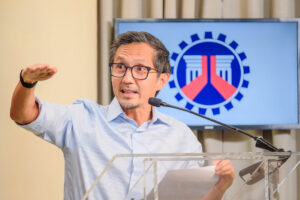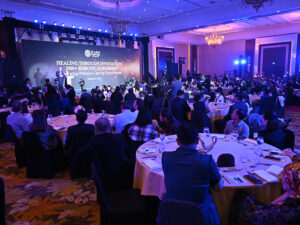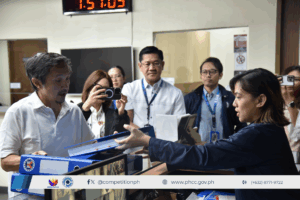By Chloe Mari A. Hufana and Justine Irish D. Tabile ,Reporters
NEWLY INSTALLED Public Works Secretary Vivencio “Vince” B. Dizon on Monday demanded the mass courtesy resignation of Department of Public Works and Highways (DPWH) officials, as President Ferdinand R. Marcos, Jr. sought a more thorough probe of corruption in big-ticket flood control projects through an independent commission.
Mr. Dizon ordered all officials of the bureau, from top to bottom, to tender their courtesy resignations for a “clean sweep” as the probe into anomalous flood control projects continues.
“My very first order will be to call for the courtesy resignations from top to bottom — undersecretaries, assistant secretaries, division heads, regional directors, down to district engineers across the entire country,” Mr. Dizon told a news briefing in Filipino.
“That is the very first directive that the President wants to issue.”
His directive came as the government deepened its investigation into alleged anomalies in multibillion-peso flood control programs, which have long been flagged for irregularities as the Philippines faces more weather disturbances.
The shake-up follows the resignation of former Public Works Secretary Manuel M. Bonoan, who took responsibility for flood control projects marred by alleged irregularities.
Asked whether the courtesy resignation order could leave the department short-staffed, Mr. Dizon downplayed the risk.
“The DPWH has a large workforce… These are courtesy resignations, which means that until their resignations are accepted, they will continue performing their duties. They cannot simply abandon their work; otherwise, they could be charged with abandonment of duty,” he said.
The DPWH head reassured the public that accountability will follow.
“If there’s evidence, I’m sure the independent commission will do its job,” he said, adding the shake-up at the DPWH should be completed within 30-60 days to ensure continuity of operations.
LIFETIME BANMr. Dizon also said contractors involved in “ghost” or substandard projects will face a lifetime ban and criminal cases.
The President is set to issue an executive order establishing an independent body that will investigate and file charges against erring officials and private contractors.
“If a project is proven to be nonexistent, it will automatically result in blacklisting — no need for lengthy investigation,” Mr. Dizon said.
Asked if this would include contractors linked to the questionable Bulacan and Kennon Road projects visited by the President last month, Mr. Dizon confirmed, “Yes.”
The crackdown will also extend to the Philippine Contractors Accreditation Board (PCAB), which will undergo a revamp with the help of the Department of Trade and Industry (DTI) and the Office of the President.
The agency has long been flagged in Senate probes as a chokepoint for questionable projects.
Addressing concerns that blacklisted firms could skirt penalties by renaming or reorganizing, Mr. Dizon said regulators will tighten scrutiny of company records and ownership.
“We just have to be very vigilant. That includes reviewing PCAB, which certifies and accredits firms. We’ve seen cases where a quadruple-A contractor had only P250,000 in paid-up capital, which is impossible,” he added.
He noted that blacklisting will extend beyond companies to their owners and officers, with the independent commission taking charge of prosecutions.
Penalties may also extend beyond blacklisting, with the perpetual disqualification of contractor licenses also under consideration.
Meanwhile, University of Makati political science professor Ederson DT. Tapia said expanding the blacklist through research and sustaining it could be effective.
While courtesy resignations are a good start, they must lead to stronger actions, including removing unfit officials and filing cases against those involved in anomalous projects, he added.
“All these should also be accompanied by periodic reports to the public,” he said via Facebook Messenger.
“The only way we don’t turn this into a case of ningas cogon is to make public involvement always alive.”
DTI INVESTIGATIONTrade Secretary Ma. Cristina A. Roque said the DTI will conduct a comprehensive investigation and a “cleanup” of the PCAB, one of its attached agencies.
“The DTI will pursue this investigation thoroughly, fairly, and without fear or favor. Those found to have engaged in wrongdoing or who compromised the public interest will be held accountable,” said Ms. Roque in a statement on Monday.
“We will not hesitate to recommend to the President the removal of anyone found to have compromised the public interest or engaged in wrongdoing,” she added.
According to the DTI, a fact-finding team was formed to oversee the investigation and to recommend reforms to prevent future lapses.
A PCAB license is among the requirements for contractors to participate in government projects.
In an Aug. 27 statement, the PCAB said the licenses are “not for sale.”
“The board has not authorized any individual, group, or third-party consultant to act on its behalf or to guarantee contractor accreditation in exchange for money,” it said.
‘TO CLEAN HOUSE’Meanwhile, Mr. Dizon acknowledged the challenge of cleaning up one of the Philippines’ most corruption-prone agencies but said immediate reforms were necessary to address flooding and infrastructure backlogs.
“The order of the President is to clean house,” he said.
Flood control projects have received billions of pesos in annual allocations under the administration, which has ranked mitigation programs as a top priority amid intensifying typhoons and climate risks.
In recent weeks, lawmakers and watchdog groups have questioned the surging costs of certain projects and the recurring pattern of contract awards. Reports have also pointed to unfinished or nonfunctional facilities despite the full disbursement of funds.
The DPWH is among the largest recipients of the national budget, securing more than P900 billion this year, a substantial share of which is earmarked for flood control projects nationwide.
Meanwhile, Mr. Marcos said the independent commission, to be created through an executive order, would act as the government’s investigative arm.
It will review reports of graft and recommend possible charges to the Department of Justice or the Ombudsman.
“The more we look, the more we find,” the President said in mixed English and Filipino at a tourism event in Pasay City. “Even in the 2026 budget, there are still insertions. It really needs to be cleaned out properly.”
The commission’s composition is still being finalized but is expected to include forensic experts, lawyers, prosecutors and former justices.
Mr. Marcos cited Mr. Dizon’s “very good” performance in the Department of Transportation, saying he had “already set the stage for all of the things that we need to do, so he can now go to Public Works, because he’s also familiar with the workings” of the agency.
The independent commission to investigate questionable flood control projects will operate under the Executive branch and will not overlap with the Ombudsman’s mandate, Palace Press Officer Clarissa A. Castro told a briefing on the same day.
She said the body will review documents, complaints, and related evidence and make recommendations on whether cases should be filed.
Ms. Castro stressed that the commission’s members will undergo strict vetting to ensure independence and freedom from corruption or political influence.






